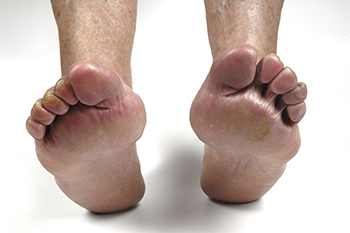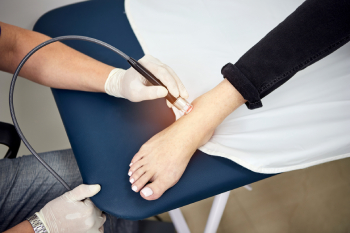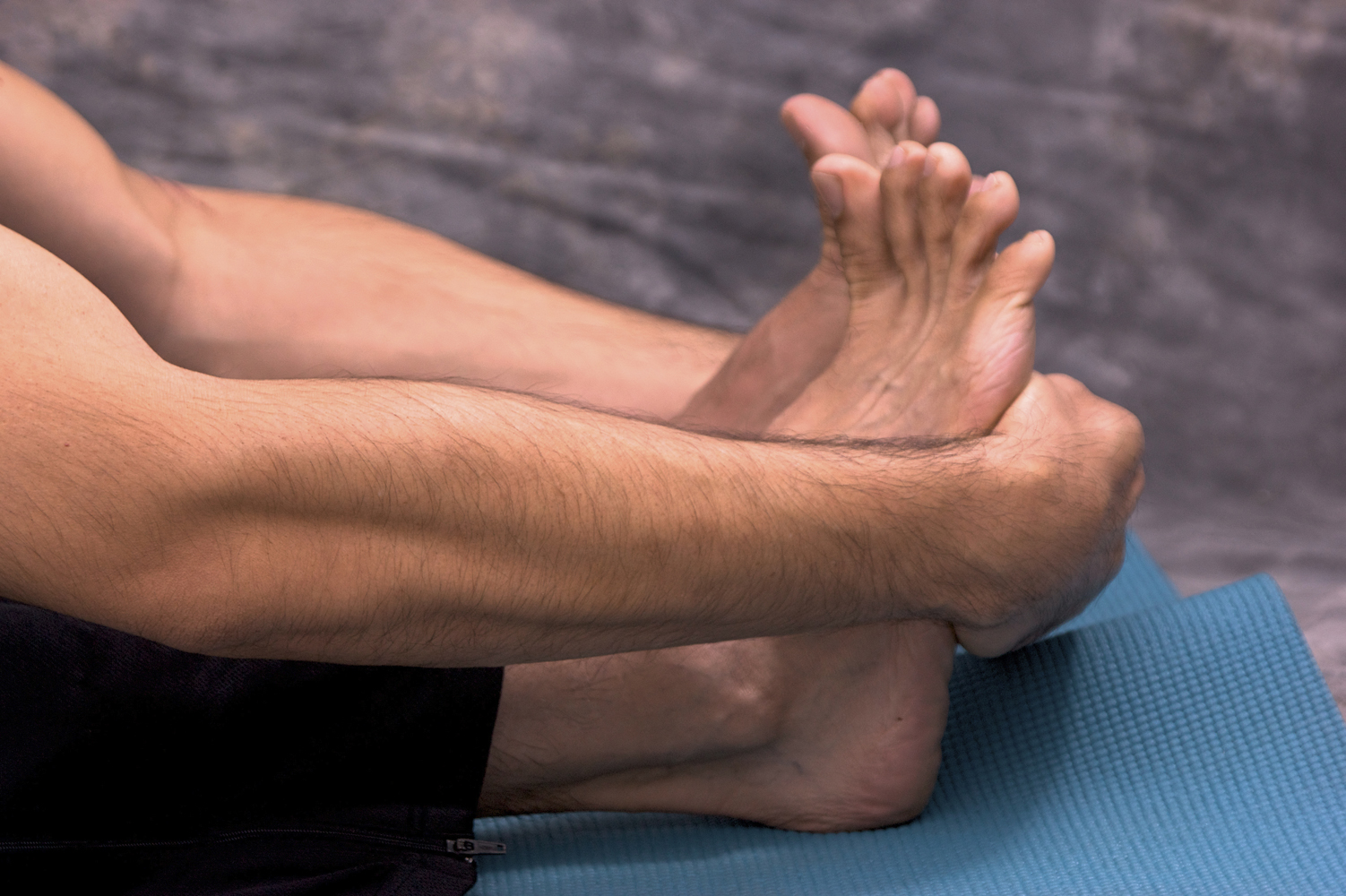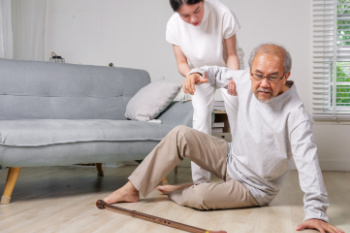
(908) 381-8160Berkeley Heights

Rheumatoid arthritis, or RA, is a chronic autoimmune disorder where the body's immune system mistakenly attacks the joints, leading to inflammation, pain, and swelling. RA commonly affects the feet, with more than 90 percent of those with the condition experiencing foot or ankle involvement. The disease can lead to joint deformities, reduced mobility, and significant discomfort in the feet, impacting a person’s ability to walk and perform daily activities. The burden of RA on the feet can be substantial, leading to difficulties in finding comfortable footwear, increased risk of foot ulcers, and a reduced quality of life. Treatment focuses on managing inflammation and pain, often through a combination of medications, targeted exercises, and lifestyle changes. Orthotic devices or specially designed shoes may be used to alleviate pressure on affected joints. Early diagnosis and treatment can slow the progression of RA and preserve foot function, helping patients maintain an active, pain-free life. If you suffer from the effects of rheumatoid arthritis on your feet or ankles, it is suggested that you are under the care of a podiatrist.
Because RA affects more than just your joints, including the joints in your feet and ankles, it is important to seek early diagnosis from your podiatrist if you feel like the pain in your feet might be caused by RA. For more information, contact Dr. Janet Leicht of New Jersey. Our doctor will assist you with all of your podiatric concerns.
What Is Rheumatoid Arthritis?
Rheumatoid Arthritis (RA) is an autoimmune disorder in which the body’s own immune system attacks the membranes surrounding the joints. Inflammation of the lining and eventually the destruction of the joint’s cartilage and bone occur, causing severe pain and immobility.
Rheumatoid Arthritis of the Feet
Although RA usually attacks multiple bones and joints throughout the entire body, almost 90 percent of cases result in pain in the foot or ankle area.
Symptoms
Diagnosis
Quick diagnosis of RA in the feet is important so that the podiatrist can treat the area effectively. Your doctor will ask you about your medical history, occupation, and lifestyle to determine the origin of the condition. Rheumatoid Factor tests help to determine if someone is affected by the disease.
If you have any questions please feel free to contact our office located in Berkeley Heights, NJ . We offer the newest diagnostic and treatment technologies for all your foot and ankle needs.

Laser therapy is emerging as a promising treatment for diabetic neuropathy, a condition caused by nerve damage that can lead to pain, tingling, and numbness, especially in the feet. Laser therapy involves using light to stimulate the damaged nerve cells, which promotes regeneration and potentially alleviates symptoms. Some studies have shown positive results, particularly with deep-tissue laser therapy. However, there remains debate over its overall effectiveness due to variations in research methods and laser types. Deep-tissue lasers, with their ability to penetrate further into the body, have been noted for their potential in reducing pain for diabetic neuropathy patients. However, more extensive research is needed to establish definitive guidelines for laser therapy's application in neuropathy. A podiatrist can evaluate individual cases and recommend the most suitable laser treatment options. They can also guide patients on the number of sessions required and discuss cost considerations, which can vary based on treatment specifics. If you have foot problems caused by diabetic neuropathy, it is suggested that you schedule an appointment with a podiatrist to find out if laser therapy is right for you.
Neuropathy
Neuropathy can be a potentially serious condition, especially if it is left undiagnosed. If you have any concerns that you may be experiencing nerve loss in your feet, consult with Dr. Janet Leicht from New Jersey. Our doctor will assess your condition and provide you with quality foot and ankle treatment for neuropathy.
What Is Neuropathy?
Neuropathy is a condition that leads to damage to the nerves in the body. Peripheral neuropathy, or neuropathy that affects your peripheral nervous system, usually occurs in the feet. Neuropathy can be triggered by a number of different causes. Such causes include diabetes, infections, cancers, disorders, and toxic substances.
Symptoms of Neuropathy Include:
Those with diabetes are at serious risk due to being unable to feel an ulcer on their feet. Diabetics usually also suffer from poor blood circulation. This can lead to the wound not healing, infections occurring, and the limb may have to be amputated.
Treatment
To treat neuropathy in the foot, podiatrists will first diagnose the cause of the neuropathy. Figuring out the underlying cause of the neuropathy will allow the podiatrist to prescribe the best treatment, whether it be caused by diabetes, toxic substance exposure, infection, etc. If the nerve has not died, then it’s possible that sensation may be able to return to the foot.
Pain medication may be issued for pain. Electrical nerve stimulation can be used to stimulate nerves. If the neuropathy is caused from pressure on the nerves, then surgery may be necessary.
If you have any questions, please feel free to contact our office located in Berkeley Heights, NJ . We offer the newest diagnostic and treatment technologies for all your foot care needs.

Regular foot exercises are essential for maintaining healthy feet, improving circulation, and enhancing flexibility in the feet, ankles, and calves. Start with circulation stretches while seated, by flexing and pointing your toes, moving them side to side, and rotating them in circles. Perform 10 repetitions on each side. Next, the towel foot stretch targets your calf and foot muscles. Sit on the floor, wrap a towel around the bottom of your foot, and use it to flex and point your toes against resistance. For a deeper stretch, bend your knee outward and pull your foot toward you. Repeat 10 times on each side. Lastly, try the calf and foot stretch. Lie on your back with your knees bent, loop a towel around your foot, and gently pull it toward you while keeping your knee slightly bent. Hold this stretch for 20 seconds on each side. Regularly practicing these foot exercises can significantly benefit your foot health. If you need guidance on foot exercises, it is suggested that you schedule an appointment with a podiatrist for an evaluation.
Exercising your feet regularly with the proper foot wear is a great way to prevent injuries and build strength. If you have any concerns about your feet, contact Dr. Janet Leicht from New Jersey. Our doctor can provide the care you need to keep you pain-free and on your feet.
Exercise for Your Feet
Exercise for your feet can help you gain strength, mobility and flexibility in your feet. They say that strengthening your feet can be just as rewarding as strengthening another part of the body. Your feet are very important, and we often forget about them in our daily tasks. But it is because of our feet that are we able to get going and do what we need to. For those of us fortunate enough to not have any foot problems, it is an important gesture to take care of them to ensure good health in the long run.
Some foot health exercises can include ankle pumps, tip-toeing, toe rises, lifting off the floor doing reps and sets, and flexing the toes. It is best to speak with Our doctor to determine an appropriate regimen for your needs. Everyone’s needs and bodies are different, and the activities required to maintain strength in the feet vary from individual to individual.
Once you get into a routine of doing regular exercise, you may notice a difference in your feet and how strong they may become.
If you have any questions please feel free to contact our office located in Berkeley Heights, NJ . We offer the newest diagnostic and treatment technologies for all your foot and ankle needs.

As people age, changes in the feet can significantly impact balance and increase the risk of falling. Structural changes such as reduced fat padding and thinning skin can make the feet more sensitive to pressure and less able to cushion impacts. Arthritis and joint stiffness can affect mobility and stability, altering gait patterns and making it harder to maintain balance. Neuropathy, or nerve damage, can diminish sensation in the feet, impairing the ability to detect uneven surfaces or obstacles. Additionally, foot conditions like bunions or hammertoes can affect alignment and stride, further compromising stability. To reduce the risk of falling, older adults should prioritize foot care, including regular check-ups with a podiatrist, wearing supportive footwear with good traction, and performing exercises to improve strength, flexibility, and balance. If you are elderly and have foot pain, it is strongly suggested that you are under the care of of a podiatrist who can treat various foot conditions and guide you on how to strengthen your feet.
Preventing falls among the elderly is very important. If you are older and have fallen or fear that you are prone to falling, consult with Dr. Janet Leicht from New Jersey. Our doctor will assess your condition and provide you with quality advice and care.
Every 11 seconds, an elderly American is being treated in an emergency room for a fall related injury. Falls are the leading cause of head and hip injuries for those 65 and older. Due to decreases in strength, balance, senses, and lack of awareness, elderly persons are very susceptible to falling. Thankfully, there are a number of things older persons can do to prevent falls.
How to Prevent Falls
Some effective methods that older persons can do to prevent falls include:
Falling can be a traumatic and embarrassing experience for elderly persons; this can make them less willing to leave the house, and less willing to talk to someone about their fears of falling. Doing such things, however, will increase the likelihood of tripping or losing one’s balance. Knowing the causes of falling and how to prevent them is the best way to mitigate the risk of serious injury.
If you have any questions, please feel free to contact our office located in Berkeley Heights, NJ . We offer the newest diagnostic and treatment technologies for all your foot care needs.